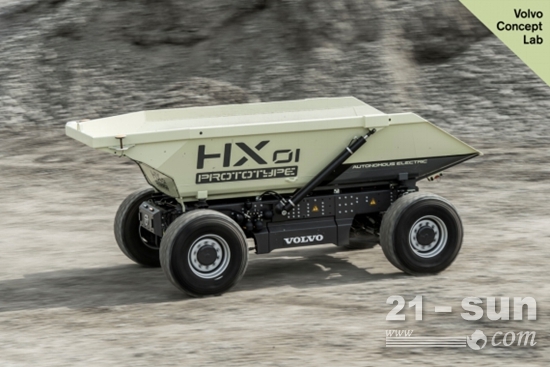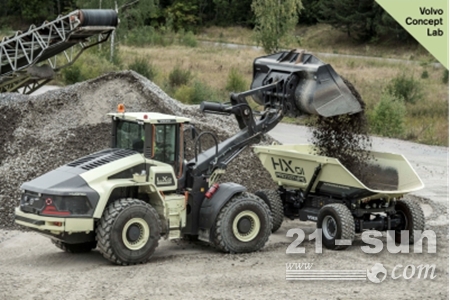
Volvo Construction Equipment launches new concept device HX2 electric loader
At the 2017 International Construction Machinery Exhibition, Volvo Construction Equipment announced its latest progress in fieldwork research on electrification. The battery-powered automated loader prototype equipment is part of the Electric Site project, which is expected to reduce carbon emissions by 95% and reduce overall costs by 25%. At the Xploration Forum held at the Volvo Construction Equipment Innovation Forum last September, Volvo Construction Equipment demonstrated the first generation HX prototype device (named HX1). Afterwards, engineers at Volvo Construction Equipment are always doing R&D. The appearance of the second-generation device and the first-generation device is not much different, but the internal design is very different.
"The HX2 is very different from the HX1," said Uwe Müller, chief project manager of the Volterra Construction Equipment Electric Site project. "The HX1 is just a proof-of-concept machine. After we determined that the project was feasible, we updated the design requirements of the HX2 and used the Volvo Group's shared technologies and components, such as electric motors, batteries, and power electronic equipment. The Volvo Group's groundbreaking R&D results in the field of electric technology, it is crucial to design a new powertrain. Another new feature is the addition of a vision system that allows the machine to detect people and obstacles around."
Complete site solution
The electrified on-site operations project aims to achieve electrification of the quarrying operations—including the intermediate transportation links from initial comminution to secondary comminution. The project involves the development of new types of construction machinery equipment, operating methods, and on-site operations management systems that together form a complete set of on-site operations solutions. In addition to the small fleet of HX2s, the prototype equipment in the electrified site project also includes an oil-hydraulic hybrid wheel loader prototyping machine and an excavator connected to the grid. It can be seen that a large number of innovative technologies are integrated in the quarry electrification equipment, fleet control systems and logistics solutions.
The Volvo LX1 loader is a hybrid hybrid power loader prototype developed by Volvo Construction Equipment and made its debut at last year’s Innovation Forum. Compared with traditional equipment, the loader can improve fuel efficiency by 50%, and can also greatly reduce emissions and noise pollution. The LX1 loader is now undergoing field testing by Waste Management, Volvo Construction Equipment's customer, North America's largest environmental services and waste recycling company, and is currently responding well.
The Volvo LX1 loader is a "pure" hybrid device whose powertrain includes an electric motor mounted on the wheel, an electrohydraulic device, an energy storage system, and a smaller diesel engine. The equipment also has a brand new equipment structure, including a newly designed lifting device. This series of "combination punches" has greatly increased the fuel economy of the equipment. The proportion of the new components of this prototype is as high as 98%, and its performance is equivalent to a conventional one-tonnage conventional wheel loader.

Volvo Construction Equipment launches new concept device HX2 electric loader
Many parties work together to create a sustainable future
Volvo Construction Equipment and its customers Skanska Sweden, the Swedish Energy Agency and two Swedish universities - Linköping University and Malaren University - jointly launched an electrification site project with a total investment of SEK 203 million in October 2015 . Volvo Construction Equipment is responsible for project coordination and development of equipment systems. Skanska Sweden is responsible for providing knowledge related to logistics solutions and job site applications. The Swedish Agency for Energy, which is responsible for Sweden's national energy policy, funds the project. The two universities are responsible for conducting research. Among them, two doctoral students are responsible for handling issues related to battery aging, energy management of electric vehicles, and functional safety.
Skanska Sweden plans to put the prototype into actual operation at a quarry in the western part of Sweden by the end of 2018, and conduct a 10-week field test on the concept of electrified on-site operations. At the end of the test, Volvo Construction Equipment will review the project results to determine the commercial applicability of this concept. At present, this work is only a research project and there is no industrialization plan.
“Volvo Construction Equipment is always committed to pioneering and exploring forward-looking future technologies,†said Jenny Elfsberg, Director of Emerging Technologies, Volvo Construction Equipment. “HX2 and electrified fieldwork projects show that Volvo Construction Equipment seeks to collaborate with users in the early stages of development to improve on-site operational efficiency and sustainability while reducing user costs. Through close cooperation with users in the development process, we can consider The content of the job, the application and the operating environment, and then the design of the best solution.The concept involved in this electrified site research project is part of the future long-term vision of Volvo Construction Equipment, has the potential to lead the quarrying industry to change. We can expect to substantially reduce fuel consumption, CO2 emissions, environmental impact, and cost per ton by replacing electricity with diesel-powered engineering equipment in quarries. By electrification of engineering equipment, less emissions, lower noise, and greater efficiency will result. High machines - these characteristics represent the future of our industry." (This article comes from Volvo Construction Equipment)
99.99% Nitrogen Generator,High Purity Nitrogen Generator,Nitrogen Generator Industrial,Nitrogen Generator Equipment
Jiangsu Minnuo Group Co.,Ltd , https://www.jsmngroupcn.com